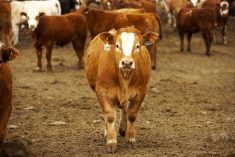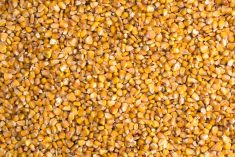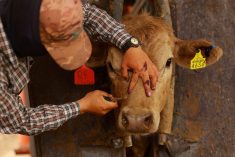U.S. President Donald Trump’s remarks Tuesday about imports of live cattle into the United States resonated predictably among that country’s various cattle producer groups.
At a White House event Tuesday, flanked by U.S. farm and ranch leaders and Agriculture Secretary Sonny Perdue for a multi-billion-dollar COVID-19-related farm aid announcement, Trump said he “read yesterday where we take some cattle in from other countries. We have trade deals. I think you should look at terminating those deals.”
Read Also

U.S. grains: Wheat futures rise on supply snags in top-exporter Russia
U.S. wheat futures closed higher on Thursday on concerns over the limited availability of supplies for export in Russia, analysts said.
When asked for further comment, he said, “I’m saying, why are we bringing in cattle, old trade deals that were made a long time ago, why are we bringing in cattle from other countries when we have so much ourselves?”
In “some cases,” he said, without naming any countries, “they’ve been great allies, they’ve been working with us for many years, sometimes we needed the cattle, sometimes we don’t…. Generally speaking, unless this is a country that has been with us, we shouldn’t be taking their cattle.”
U.S. Department of Agriculture data show that apart from one lone bovine from Australia in 2018, the United States in the past decade accepted live cattle imports from just two countries: Mexico and Canada.
Both are signatories to the Canada-U.S.-Mexico Agreement (CUSMA), the trade pact ratified earlier this year by all three countries as a replacement for NAFTA and hailed by Trump as “a big deal” at the same event Tuesday.
U.S. National Cattlemen’s Beef Association (NCBA) president Marty Smith, who attended the event, was quoted later by Reuters describing Trump’s remarks as “something I wish the president hadn’t said,” and adding the suggestion may have resulted from a misunderstanding.
By USDA’s count, Mexico and Canada exported 1.32 million and 722,809 head of cattle to the U.S. respectively in 2019, followed by 345,713 and 184,483 head in the first quarter of this year.
Canada and Mexico also take nearly all live cattle exports from the U.S., at 272,380 and 22,233 head in 2019 respectively, and 56,149 and 3,767 head in Q1 2020.
In a separate statement later Tuesday, NCBA CEO Colin Woodall said Trump’s comment “demonstrates the complexity of the U.S. beef business.”
Live cattle imports to the U.S. “only come from Canada and Mexico and will continue to do so under the terms of the President’s newly negotiated (CUSMA),” he added, also noting “America has not imported live cattle from other nations for several years.”
Echoing NCBA’s statement, Canadian Cattlemen’s Association president Bob Lowe said the CCA, “along with our North American counterparts, is fully committed to continue enhancing the strength of the North American beef industry under the newly negotiated and soon-to-be implemented (CUSMA).”
Beef producers in both Canada and the U.S. “depend on reliable trade partners to attain the highest value for their products, whether it is beef or cattle,” the CCA said.
‘Prioritization’
In a separate statement Tuesday, U.S. Cattlemen’s Association (USCA) president Brooke Miller said that group’s members “greatly appreciate (Trump’s) comments on the need to stem the influx of imported cattle into this country.”
USCA, in the same statement, noted it had written to Perdue last month “requesting the prioritization of U.S. beef and cattle as the nation experiences the impacts of ripe feedyards and decreased slaughtering capacity.”
R-CALF USA, a protectionist ranchers’ group, hailed Trump’s remark in a separate statement Wednesday, saying U.S. ranchers “have been particularly harmed by the influx of cheaper live cattle imports that produce undifferentiated beef, which effectively displaces American ranchers’ access to their own domestic market.”
Quoting a letter its CEO Bill Bullard submitted to Trump on Tuesday, R-CALF said ending live cattle imports “will help reverse the ongoing contraction of America’s ranching industry.”
Pointing specifically to the U.S. Northwest, R-CALF said 282,000 fat and feeder cattle are imported into that region annually from Canada, and cited NCBA as saying those imports are meant to help U.S. feedlots and packing facilities “run at optimal levels.”
R-CALF, however, alleged those imports have “effectively displaced about 180,000 head of beef cows and 18,831 cattle ranches” in the U.S. Northwest alone.
“Neither Canada nor Mexico have treated the United States fairly in the free trade agreement we have had with them since 1994,” Bullard said in his letter to Trump.
NCBA’s Woodall on Tuesday took a jab instead at U.S. meat imports, adding that if Trump “is serious about reconsidering import decisions, NCBA and its members strongly request the White House to take another look at his decision to allow fresh beef imports from nations like Brazil.”
Brazil, he alleged, continues to have “concerns with foot-and-mouth disease” (FMD). The World Organization for Animal Health (OIE) in May last year declared all of Brazil as FMD-free with vaccination.
U.S. cattle producers, Woodall said, “rely on safe and reliable international trading partners, both as a destination for the undervalued cuts we produce here, such as hearts, tongues and livers, and for importation of lean trim for ground beef production to meet strong consumer demand.”
About 12 per cent of beef consumed in the U.S. is imported product, he said, “but that product must meet the U.S. standards for safety before it is allowed into our market.” — Glacier FarmMedia Network














